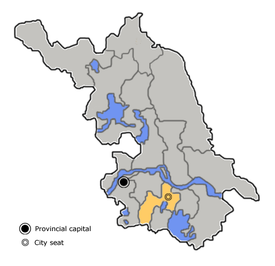Changsu
|
Changzhou 常州市 |
|
|---|---|
| Prefecture-level city | |
 |
|
 Location of Changzhou City jurisdiction in Jiangsu |
|
| Location in China | |
| Coordinates: 31°47′N 119°58′E / 31.783°N 119.967°ECoordinates: 31°47′N 119°58′E / 31.783°N 119.967°E | |
| Country | China |
| Province | Jiangsu |
| Divisions | 5 districts, 1 city |
| Government | |
| • Party Secretary | Yan Li |
| • Mayor | Fei Gaoyun (费高云) |
| Area | |
| • Prefecture-level city | 4,384.58 km2 (1,692.90 sq mi) |
| • Urban | 1,872.1 km2 (722.8 sq mi) |
| Population (2010 census) | |
| • Prefecture-level city | 4,592,431 |
| • Density | 1,000/km2 (2,700/sq mi) |
| • Urban | 3,290,918 |
| • Urban density | 1,800/km2 (4,600/sq mi) |
| • Metro | Shanghai-Suzhou-Wuxi |
| Time zone | China Standard (UTC+8) |
| Postal code |
213000, 213100 (Urban center) |
| Area code(s) | 0519 |
| GDP | 2010 |
| - Total | CNY 297.67 billion (USD 47.7711 billion) |
| - per capita | CNY 65000 (USD 10,431.12) |
| - Growth |
|
| License Plate Prefix | 苏D |
| Local dialect | Wu: Changzhou dialect |
| Website | www.changzhou.gov.cn |
| Changzhou | |||||||||||||||||

"Changzhou", as written in Chinese
|
|||||||||||||||||
| Chinese | 常州 | ||||||||||||||||
|---|---|---|---|---|---|---|---|---|---|---|---|---|---|---|---|---|---|
|
|||||||||||||||||
| Transcriptions | |
|---|---|
| Standard Mandarin | |
| Hanyu Pinyin | Chángzhōu |
| Gwoyeu Romatzyh | Charngjou |
| Wade–Giles | Ch'ang2-chou1 |
| IPA | [ʈʂʰǎŋʈʂóu] |
| Wu | |
| Romanization | Zaontsei |
213000, 213100 (Urban center)
213200, 213300
Changzhou (Chinese: 常州) is a prefecture-level city in southern Jiangsu province of China. It was previously known as Yanling, Lanling, Jinling, and Wujin. Located on the southern bank of the Yangtze River, Changzhou borders the provincial capital of Nanjing to the west, Zhenjiang to the northwest, Wuxi to the east, and the province of Zhejiang to the south. Changzhou is part of the highly developed Yangtze Delta region of China extending from Shanghai going northwest, which now has more than 36,000,000 inhabitants. Its total population was 4,592,431 inhabitants at the 2010 census whom 3,290,918 lived in the built-up area made up of 5 urban districts. The agglomeration is now part of the Suzhou-Wuxi-Changzhou metropolitan area which has now more than 36,000,000 inhabitants, only second in China after the Pearl River Delta Economic Zone.
"The Ruins of Yancheng" (淹城遺址), comprise the remains of a walled city located in the Wujin district of Changzhou that was founded over 3000 years ago at the beginning of the Western Zhou dynasty. The earliest record of a settlement on the site of modern Changzhou is as a commandery founded in 221 BC at the beginning of the Qin Dynasty. During the interregnum between the Sui and Tang, the city of Piling (毗陵) was the capital of Shen Faxing's short-lived Kingdom of Liang (AD 619 to 620). Changzhou got its present name meaning "ordinary prefecture" in 589. Following construction of the Grand Canal in 609, Changzhou became a canal port and transshipment point for locally-grown grain, and has maintained these roles ever since. The rural counties surrounding Changzhou are noted for the production of rice, fish, tea, silk, bamboo and fruit.
...
Wikipedia

